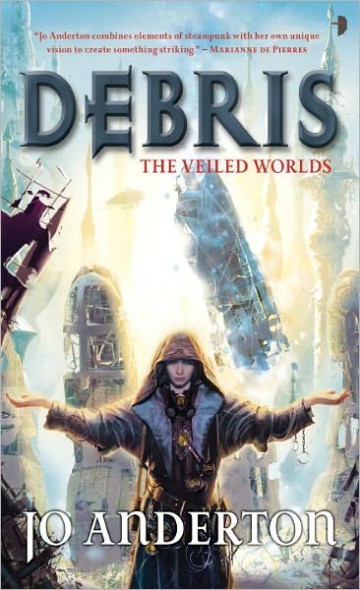Cross posted from here.

I enjoyed Debris by Jo Anderton.
I read a lot of fantasy, especially by Australian writers (no surprise that they’re dominating my reading so far this year). I’ve found that Australian fantasy is less likely to stick to clichéd convention and in that respect, Debris definitely does not disappoint.
The magical system Anderton has developed is focused around pions — bearing no resemblance to the mesons beloved by particle physicists, if you were wondering — tiny, glowing particles that permeate reality and which can be manipulated by people sufficiently skilled and trained. Some people can bind pions to their will, some can’t even see them. The debris of the title is magical matter left over from pion binding; useless refuse that disrupts crucial pions if not cleared away. Overall, the world has a little bit of a steampunk feel to it, mostly because that was the level of technology the society reached before the pion revolution something like 200 years before the start of the story.
The main character, Tanyana, is a highly skilled pion binder architect before she falls — both literally and metaphorically — in the first chapter. Or was she pushed? Forced to live the life of a lowly debris collector when her former lifestyle is lost to her, Tanyana struggles to find some explanation for what happened to her. Because she is convinced something else was there, when she fell, something that pushed her but that no one else could see.
I enjoyed Tanyana as a character. She is arrogant, but I didn’t see that as a bad thing. It made her interesting. She is both realistic and self-deluded about different things (for example, she’s not trying to get her life back, rather to find answers, but on the other hand, she tries to cling to the trappings of her old life a little too long). Most of all, when everything is taken from her, she is a survivor. She finds something else to be a part of. Of course, she doesn’t enjoy it at first, but she accepts it fairly quickly.
The other characters weren’t painted nearly as brightly as Tanyana. Mostly, this is due to the first person nature of the narrative. We know exactly what’s going on in Tanyana’s head all the time, but she doesn’t spend overly much time dwelling on other people (barring special exceptions). It was very much a one-woman show, with everyone else playing second fiddle, which isn’t a bad thing, given the external events also revolve about Tanyana. The only thing, characterisation-wise, that put me off a bit was her love interest. In the scene where they first hook up, I couldn’t really understand at the time why she interested in him, beyond the fact that he provoked her. It does make sense in retrospect, and the subsequent interactions between them worked well, but at the time that first scene left me ambivalent.
The conspiracy and the action in the latter half of the book had be eagerly turning the pages, however it started a more slowly and built up the world gradually. Also, while the climax was very much the most crucial scene in the book, I found the penultimate all-hell-breaks-loose disaster more exciting, in the action-packed sense.
As I said at the start, I enjoyed this book a lot. I am looking forward to reading the sequel out in July this year.
I am also about to go off and read Grandeur, a prequel short story which you can find on Jo Anderton’s website here.
Rating: 4.5 / 5 stars

No comments:
Post a Comment
Note: only a member of this blog may post a comment.